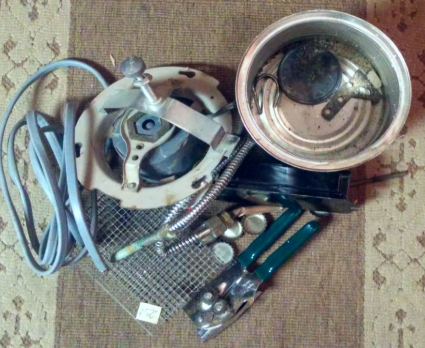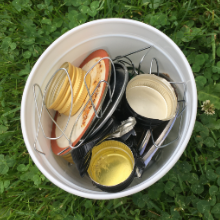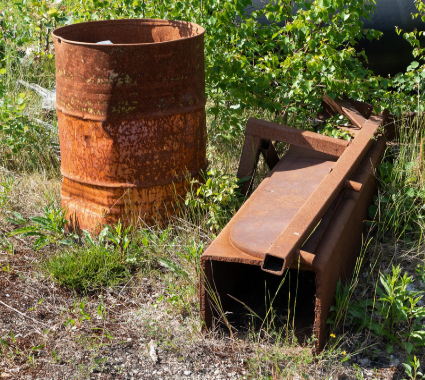 There is a limited amount of metal on our planet so it is important to keep it out of the landfill so it can be used again and again. Recycling metal helps protect water quality and wildlife habitats because it reduces the amount of new metal that must be mined. Metal can be continuously recycled.
There is a limited amount of metal on our planet so it is important to keep it out of the landfill so it can be used again and again. Recycling metal helps protect water quality and wildlife habitats because it reduces the amount of new metal that must be mined. Metal can be continuously recycled.
In Vermont, clean metal cans, foil, pie plates, and bottles from food and drink go in blue-bin, mixed recycling. Scrap metal is managed separately as Special Recycling.
What to do with Scrap Metal
#1 Collect it!
Households can store scrap metal in any area, such as in the basement, garage, or under the sink, until there is enough for a trip to the recycling center or local salvage yard. Keep small metal parts out of reach of children, so they do not become a choking hazard. Large quantities can also be stored anywhere, such as a warehouse, garage, storage unit, or at construction sites. Before recycling scrap metal, check if it has any liquids that could be considered hazardous and whether that liquid should be brought to a household hazardous waste collection event or facility.
#2 Find out where to bring it.
Scrap metal recycling varies across the state, so contact your local waste district or town or transfer station for specifics. Some facilities offer free recycling of scrap metal under a certain weight while others charge a nominal fee.
Many reuse stores and salvage yards also accept scrap metal. Salvage yards will often pay for scrap metal, but they may not pay for small quantities. Find salvage yards to contact on the DEC Salvage Yard Program website.
What is Scrap Metal?
Scrap metal is anything that is at least 80% metal. The type of metal does not matter. It can be steel, aluminum, copper, brass, bronze, or other metals. Common household scrap metal includes pots and pans, bicycle parts, grills, exercise equipment, lawn furniture, nails, nuts and bolts, bottle caps, and wire.
Large appliances, like refrigerators, stoves, washers, and dryers, are also scrap metal and are banned from the landfill in Vermont. Due to their size, they are collected separately at most waste facilities. Some appliances also contain environmentally harmful materials, like refrigerants, that facilities must remove and manage carefully. Large appliances are sometimes called “white goods,” because they were traditionally white. Appliances in good working order can be sold, donated, or given away to be used by someone else. Broken appliances and old, inefficient appliances can be dropped off at select locations.
Ask your local transfer station if they accept white goods and other scrap metal. To find a local transfer station, contact your local waste district or town or find a drop-off near you on the Materials Management Map.
These items are not scrap metal and do not belong in your mixed, blue-bin recycling:
- Propane tanks (can be brought to salvage yards)
- Tanks of compressed gas (except certain helium tanks)
- Batteries
- Oil filters
- Electronics (like TVs, Computers, Laptops, Desktop Printers)
To learn how to manage these items, explore the household hazardous waste, batteries, and electronics webpages or contact your local waste district or town.
